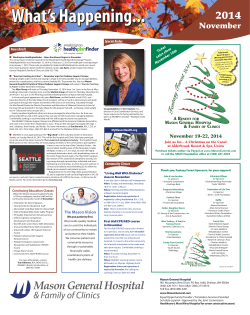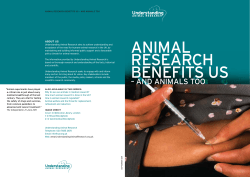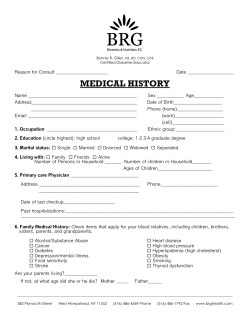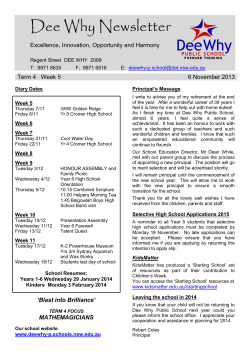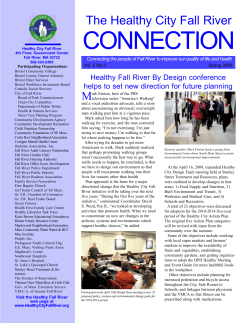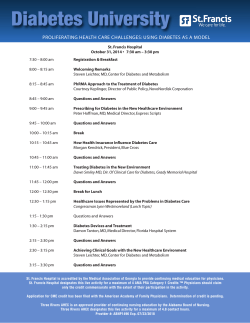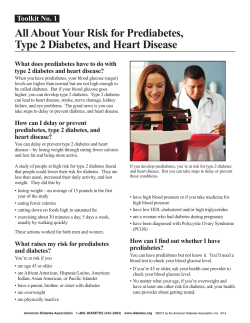
Healthy Living with Diabetes PowerPoint Presentation
Healthy Living with Diabetes Presented by the Wisconsin Institute for Healthy Aging, Wisconsin Department of Health Services and their partners 12/2013 Why is Healthy Living with Diabetes Needed? • 1 in 12 Americans affected by diabetes • By 2050 there will be 40 million Americans with type 2 diabetes • WI: 475,000 adults with diabetes and 1.45 million adults with pre-diabetes • Even higher incidence in communities of color • 25% of Wis. Medicare beneficiaries have type 2 diabetes 12/2013 Consequences of Diabetes • Mortality is twice that of people without diabetes of similar age • Leading cause of blindness, heart disease, and stroke – and lower extremity amputations • Very expensive to treat - 2009 Wisconsin data – $4.07 billion in direct health costs – $2.7 billion in indirect costs 12/2013 The Healthy Living with Diabetes Program • Community workshop • For individuals with type 2 diabetes, prediabetes or either who live with or care for or about someone who does • 2.5 hours/week for 6 weeks • Led by 2 trained co-leaders, 1 with diabetes or has a connection to someone with diabetes (e.g., caregiver, CDE, etc.) 12/2013 The Healthy Living with Diabetes Program • Evidence-based • Meets AoA’s highest standard • Developed by Stanford University’s Patient Education Research Center with CDEs • Developed over years of: – pilot-testing – refinement – evaluative research http://patienteducation.stanford.edu/ 12/2013 12/2013 Program’s Underlying Assumptions • People with diabetes have similar concerns and problems • They must deal with both physical symptoms and impact on lives/emotions • Lay people can teach program as effectively, if not more effectively, than health care professionals • The program process is as important, if not more, than substance 12/2013 Researched and Proven Study Results show: • • • • • • • 12/2013 improved diabetes self-management self-efficacy decreased symptoms of hypo and hyperglycemia improved HbA1C decreased health distress improved communication with physicians improved self-rated health decreased emergency room visits Works well with Existing Diabetes Education Programs and Certified Diabetes Educators • Group problem-solving compared to expert and student approach • No individualized medical advice = more discussion time for daily living with diabetes • Some similar topics; approach very different • Peer-led education very motivating • Health team prescribes “what” needs to be done; workshop gives peer support to “how” 12/2013 Target Population • Adults with type 2 diabetes or pre-diabetes • Adults who live with or care for or about someone who has type 2 diabetes or prediabetes • Regardless of how long the person has been living with diabetes • Cognitively able to participate in process 12/2013 Topics • Techniques to deal with physical symptoms of diabetes • Dealing with difficult emotions • Appropriate exercise • Meal planning for people with diabetes • Appropriate use of medication • Working more effectively with health care professionals 12/2013 12/2013 Dissemination in Wisconsin • • • • 12/2013 Began in 2013 Diverse agencies offer the workshop Diverse sites host the workshops Diverse professionals or lay individuals who serve as leaders Leader Qualifications & Characteristics • Health care, aging or disability network professionals, or lay volunteers • At least one Leader has diabetes or close connection • Experience with diabetes – personal or professional • Comfortable leading groups of adults • Comfortable following a script • Past participants encouraged! 12/2013 Leader Expectations • • • • • • • 12/2013 Attend all four* days of Leader trainings Work with a sponsoring organization Lead workshops in pairs, both trained Lead two workshops each year Follow program script Use required books and charts Follow WIHA administrative protocols * There is a separate two-day cross training for current Living Well Leaders Are You Ready? • • • • Identify the local sponsoring organization AND Identify your co-leader AND Communicate with local aging unit AND Together, review the Planning Guide (see next slides) * One or both Leaders must have diabetes or close connection 12/2013 Healthy Living with Diabetes Leader & Local Partner Organization Planning Guide • Identify local sponsoring organization, e.g., county/tribal aging unit or hospital-based coordinator • Obtain supervisor support from your place of employment (if applicable) • Connect with a health care provider and any CDE • Identify two Leaders – already trained or need training? • Select dates and times for first workshop • Decide whether workshop will be free or a fee • Select and reserve site, room, room arrangement • Who will submit workshop notification to WIHA? • What agency will receive workshop registrations? Continued... 12/2013 Healthy Living with Diabetes Planning Guide, cont’d • Outreach and Marketing – See WIHA website materials – Presentations – Where? Who will present? – Health Care providers, including CDEs – Individual recommendations – Who? • Supplies needed – Copies of Living a Healthy Life with Chronic Conditions – Required charts – Easels, blank flipchart pads, tape, and markers – Participant handouts – Refreshments • Data Collection • Funding Needed? 12/2013 12/2013 Website for Leaders www.wihealthyaging.org – Click on FOR LEADERS ONLY – Click on Healthy Living with Diabetes – username: leaders@wihealthyaging.org password: wihaleaders 12/2013 12/2013 12/2013 12/2013 12/2013 Support for Leaders • Listserv • WIHA Leader Newsletter • Regular Leader conference calls or meeting where available • Technical assistance • Leader Coaching • Healthy Aging Summit 12/2013 Leader Training • Come in pairs, or solo if county already has a trained Leader • Four* full days – must attend all to learn: – basics on diabetes – curriculum of Healthy Living with Diabetes program – group facilitation, including practice • Learn WIHA protocols and support available • During first workshop, may have coaching session *Two days if cross-training 12/2013 Leader Training – to apply • • • • Leader Application – link on WIHA website Complete application; pay fee Commit to requirements Attend in pairs, unless already a Leader in county • With Sponsoring Organization, complete Planning Guide • 20-person limit 12/2013 ? ? ? QUESTIONS ? ? ? • Betsy Abramson 608-243-5691 betsy.abramson@wihealthyaging.org • Sherri Ohly 414-687-1223 sherri.ohly@wihealthyaging.org • Anne Hvizdak 715-677-3037 anne.hvizdak@dhs.wisconsin.gov 12/2013 THANK YOU! 12/2013
© Copyright 2025

